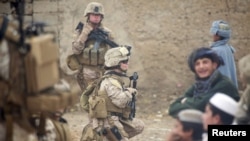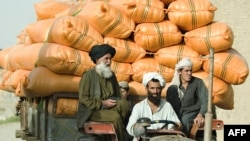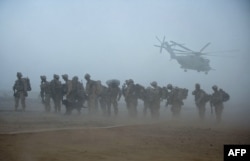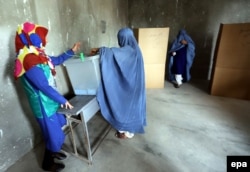In a piece published on August 14, the Russian government-funded broadcaster RT quoted Russian experts and officials as saying the U.S. military presence in Afghanistan is destabilizing that country and the entire region.
Some of the experts even claimed the United States is supporting terrorist groups in order to undermine the security of Central Asian countries and Russia while pursuing its geopolitical goals.
Мikhail Aleksandrov, an expert with the Center for Military and Political Research at the Moscow State Institute of International Relations, told RT: “U.S. actions in Afghanistan are destabilizing, harmful to neighboring countries but above all to Afghanistan itself… ISIS was created by the United States to solve geopolitical problems in the Middle East, [but] now they see it’s not working there and are preparing to move ISIS to Central Asia.”
Russia’s Special Envoy for Afghanistan Zamir Kabulov, who claimed in his comments to RT that “Moscow never pressed for a U.S. withdrawal from Afghanistan,” also told the newspaper Izvestia that Russia now wants the United States to pull out of Afghanistan because “the U.S. Army is unable to really do anything.”
Back in March, Kabulov claimed that the Taliban, which Moscow designated as a terrorist group back in 2006, had become an “internal armed opposition” in Afghanistan and was no longer pursuing a “trans-border jihad.”
That same month, U.S. Army General Curtis Scaparrotti, who is also the Supreme Allied Commander Europe of NATO Allied Command Operations, suggested Russia was supplying the Taliban.
Brian Williams, a professor at the University of Massachusetts – Dartmouth who spent years in Afghanistan, told Polygraph.info in March that comments like Kabulov’s were “yet another example” of Soviet-style disinformation.
In Iraq, U.S.-allied forces and Iraqi troops have dealt a heavy blow to IS operations, and IS-controlled territory in that country has shrunk dramatically after the allied victory in Mosul.
Nor has the United States supported pushing IS militants into Afghanistan. In fact, the U.S.-backed military operation in Afghanistan has prevented both the Taliban from ousting the government in Kabul and the Islamic State affiliate in Afghanistan, ISIS-K, from expanding its operations in greater Central Asia.
The U.S.-led coalition and Afghan forces are also making progress in degrading ISIS-K.
U.S. Navy Captain Bill Salvin, the spokesperson for U.S. troops and NATO’s Resolute Support mission, said in March that the goal was “to defeat ISIS-K” in Afghanistan this year.
The following month, Salvin said that Afghan and coalition forces had reduced ISIS-K-held territory by two-thirds and the number of its fighters by at least half since the group emerged in 2015.
“We should applaud U.S. efforts to cut down the presence of IS fighters in Afghanistan,” Michael Kugelman, a South Asia expert with the Washington-based Woodrow Wilson Center, told VOA's Afghan service.
On Monday, U.S. President Donald Trump announced a new U.S. strategy for Afghanistan, which, he said, will include a "clear definition" of victory: "attacking our enemies, obliterating ISIS, crushing al-Qaeda, preventing the Taliban from taking over the country, and stopping mass terror attacks against Americans before they emerge."
Trump also urged Pakistan to do more to eliminate terrorist sanctuaries on its soil and India to provide Afghanistan with more economic and development support.
While he did not provide any details about how many more troops will be deployed to Afghanistan, according to congressional officials, the administration will send in approximately 4,000 additional U.S. troops.
Besides bolstering Afghan and regional security, the U.S. presence in Afghanistan has also helped advance democratic institutions, human rights, and economic opportunities in the country.
As the University of Massachusetts – Dartmouth’s Williams told Polygraph.info in March, millions of refugees have returned to Afghanistan, millions of Afghan girls once banned from schools are now getting an education, fields have been de-mined and thousands of wells dug.
“Women are in parliament and even the police force for the first time. There have been the first democratic elections in the country's history,” Williams said.
According to the Pentagon's Special Inspector General for Afghanistan Reconstruction (SIGAR), the United States has obligated an estimated $714 billion for all spending, including war fighting and reconstruction, in Afghanistan since 2001.








